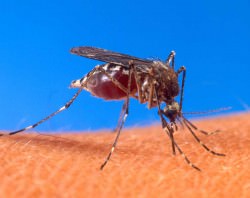[/caption]
Mosquitoes are a hardy, resilient sort; these insect have been around for thousands of years and recently, one mosquito even survived a stint in space. Mosquitoes aren’t just an annoyance, but they also carry deadly diseases. Now, humans may have a new defense against mosquitoes and the diseases they carry, like malaria. Laser technology developed for the Cold War missile defense system called the Strategic Defense Initiative (also known as Star Wars) is now being retooled to for the fight against mosquitoes. The laser system is intelligent enough that humans and butterflies aren’t affected by the beams, but it zaps mosquitoes flat. It can even tell the difference between female mosquitoes, the blood-drinkers, and males. “We like to think back then we made some contribution to the ending of the Cold War” with the Star Wars program, said Dr. Jordin Kare. “Now we’re just trying to make a dent in a war that’s actually gone on a lot longer and claimed a lot more lives.”
The original use of the lasers would shield the US against the Soviet nuclear arms. Its rebirth as a bug killer came from Nathan Myhrvold, a former Microsoft Corp. executive who now runs Intellectual Ventures LLC., a company that collects patents and funds inventions. His old boss, Bill Gates, had asked him to explore new ways of combating malaria. At a brainstorming session in 2007, Dr. Lowell Wood, an astrophysicist who helped develop the Star Wars technology, suggested using lasers on mosquitoes.
The scientists envision their technology might one day be used to draw a laser barrier around a house or village that could kill or blind the bugs. Or, laser-equipped drone aircraft could track bugs by radar, sweeping the sky with death-dealing photons.

They now face one big challenge: deciding how strong to make the weapon. The laser has to be weak enough to not harm humans and smart enough to avoid hitting useful bugs. “You could kill billions of mosquitoes a night, and you could do so without harming butterflies,” says Myhrvold.
During a recent demonstration, the researchers were able to locate mosquitoes in an old 10-gallon fish tank using a camera with a zoom lens which fed the visual data into a computer which controls the laser and aims the beam at the bugs. When hit, the mosquitoes burst into flame. Each time a beam strikes a bug, the computer makes a gunshot sound to signal a direct hit.
Not only can the laser target a mosquito, it can also tell a male from a female based on wing-beat. That’s a crucial distinction, since only females feed on blood and thus transmit disease.
“If you really were a purist, you could only kill the females, not the males,” Myhrvold sad. But since they’re mosquitoes, he says, he’ll probably “just slay them all.”
Other scientists have worked on ways to eradicate mosquitoes with microwaves, or genetically altering the insects to build a version that is malaria free. Another researcher is looking for a way to make mosquitoes as a force for good, by transforming them into “flying syringes” that deliver vaccines each time they bite.
Source: Wall Street Journal


Iunno… are mosquitoes REALLY that important to the food chain?
I say wipe ’em out and good riddance. 🙂
(Serious 🙂 )
Mosquitos are the enemies of humanity and should be exterminated to extinction?
I wonder how the environmentalists (emphasis on mental) feel about this.
Environmentalist will not allow this, they will say birds.bats feeds on them. If mosquitos kills 200,000,000 people per year, environmentalist says this is how it is, balance of nature!!!!
I’m sorry but I don’t like mosquitos..
“Mosquitoes are a hardy, resilient sort; these insect have been around for thousands of years ”
Thousands of years? Try ~150 million.
Hambone,
“Six legs good; two legs bad.”
=)
God I love the mindset of the mil industrialists.
“How do we kill Mosquitos? WITH A GIANT LASER, one by one!”
I’m sure there’s a minimalistic way to both cut infection rates while saving enough Mosquitos for the food chain.
Most likely by targeting females near towns, while leaving those in the wilds alone.
Evolution should give them a native distaste for humans.
This people have gone crazy and openly ridiculous.
And, as they have managed to get Russia back in the nuclear weapons race, it would be better to keep those lasers pointing the sky to kill enemy nuclear warheads and not mosquitoes.
Confuzius, he says:
Don’t use canons to kill mosquitos!
As for the niche mosquitoes have as food for birds and bats, bats prefer flies and insectivorous birds eat a wide variety of insects. So running mosquitoes out of areas where we live isn’t going to deprive other creatures of food, except maybe for fish and dragonflies that feed on mosquito larvae. And even then, those predators are adaptable, so no harm done.
This had better not fall into the wrong hands-Juice it up a little and there will be a lot more than mosquitos lighting up the night.
Nancy,
are you sure you weren’t supposed to hold this article and run it the first of next month?
And suddenly it becomes obvious who has and hasn’t read the original article:
And apparently I missed a tag – oh well.
Kick arse. Can’t wait until up-scaled versions are flying through parts of the world on drone aircraft melting people’s faces into piles of goo. Who doesn’t want more deadly and advanced weapons of war, right? Undoubtedly DARPA has thought of it and trialled it.
Anyway, despite the obvious extension to human warfare, the tech is cool. I suppose you could set a little drone loose and fly around infected areas when the season draws nigh. However, human beings tend to both everything when they try to control a facet of nature. Actions have unpredictable consequences in complex systems, and the environment is most certainly a complex system. Think cane toads released in Australia to combat the cane beetle. The original cane beetle problem pales into laughable insignificance when compared to the current cane-toad problem.
Maybe the mozzies feed some type of insect that feed a bird that pollinates certain plants that provide the only local natural source of food for the blahblah people in Central Africa. Maybe that bird decides there’s more food elsewhere and buggers off. Who knows? It’s not just a greenie issue – we’ve botched this sort of thing countless times before, and it only ever seems obvious in retrospect that we didn’t understand some crucial aspect of an environmental system before we bludgeoned some aspect of it to a state beyond repair. This can have disasterous unforseen consequences.
Flies however – they can’t possibly be of any use in nature – I’ve thought about it carefully for 5 minutes and I’m sure of it. Nuke ’em all.
“…tend to both everything…” > “…tend to botch everything…”
Well, the difference in this case is that if such an environmental dependency was found, they could simply stop killing mozzies…their population could then rise again. With the Cane Toad Debacle ( CTD ), you cant simply un-release the cane toads into the environment, so that can of worms ( toads? ) is already open.
In some regions of Russia, the mosquitoes are so bad whole areas are inaccessible during the year. For example after the 1908 Tunguska Fireball crashed in Central Russian Krasnoyarsk Krai region, the peat bog site was simply inaccessible for several months in mid-summer just because of the stupendous numbers of mozzies.
So I suppose at least they are Russian mosquitoes and not good old American ones.
I LOVE it!!
Get a frikkin’ huge laser to deal death to mozzies!!
(OK, the reality will probably be a tad more prosaic, but I can dream can’t i? Mwah hahahahahahahahahahahahaaaaaaa!!!)
A bailout of epic proportions…the resurrection of the “Evil Empire” rhetoric, except this time, the lasers are pointed at mosquitoes. Perhaps a great opportunity to inspire the masses by reminding them that the Cold War lives on.
Deliberate wiping out of a species ought never be an option, even if they are evil little mozzies that ruin your holiday and spread disease.
I’m of the opinion that forced extincion is wrong even for viruses such as smallpox.
“thousands of years”
You mean 6000 years maybe ? lol
Of course, demonstrating to our enemies that we have the capability of both targeting and verify that we have targeted a mosquito is just a happy side effect.
Or perhaps the real justification for the budget for this.
I’m going to try my laser pointer out on ’em!
My Slavic friend told me in the Yakutsk valley of the Lena River basin, the misquitos are so big in the spring thaw they need chicken wire to stop them. I am not about to find out if he is fool of it or on too much vodka, but the winters are the coldest of any city Yakutsk and the Lena River runs north toward the arctic..
It is an interesting debate (not the canons against mosquitoes, but the forced extinction issue).
I believe that all existing species are here for one reason or other. Together they make the system stable.
Fine, the problem is that some species and particularly, many micro-organisms and viruses are extremely dangerous and pose a real threat to us as a species.
Smallpox is a good example; maybe the virus had role to play. The infection caused about 35% mortality, the rest survived (albeit with badly pocked faces). My grandmother had it and she survived.
It could be that the existence of the variola virus performed a sort of natural selection of the stronger. Or maybe another reason I cannot imagine.
But the social costs of leaving it act freely are obviously unacceptable.
So we were lucky we could eradicate it and this was good for us, IMHO. So far, the only malign virus eradicated. But mother Nature quickly replaced it by a few others, such as Ebola and AIDS.
Could this laser do anything for the debris in orbit? If it can target little mosquitoes then it can surly get some of the junk up there. Would a laser work on some of that?
Dominion Says:
“Could this laser do anything for the debris in orbit?”
Probably not – it could probably turn functional equipment in orbit into more debris, though… I mean, isn’t that what it does to mosquitoes: turn them into debris?
APRILFOOOOOOOLLLLL